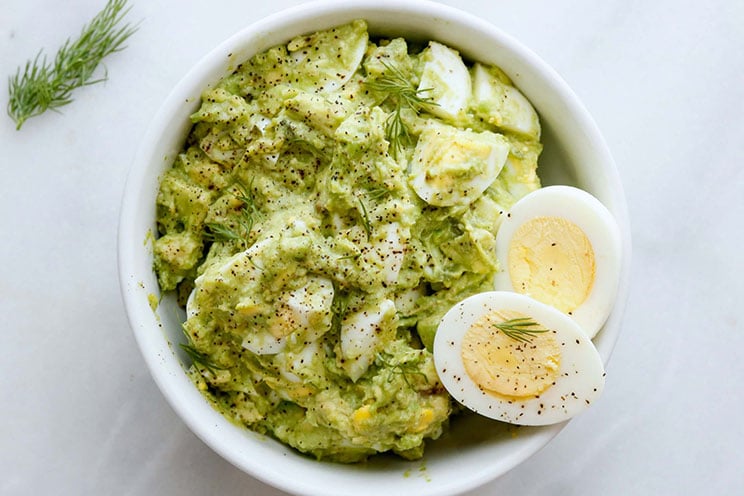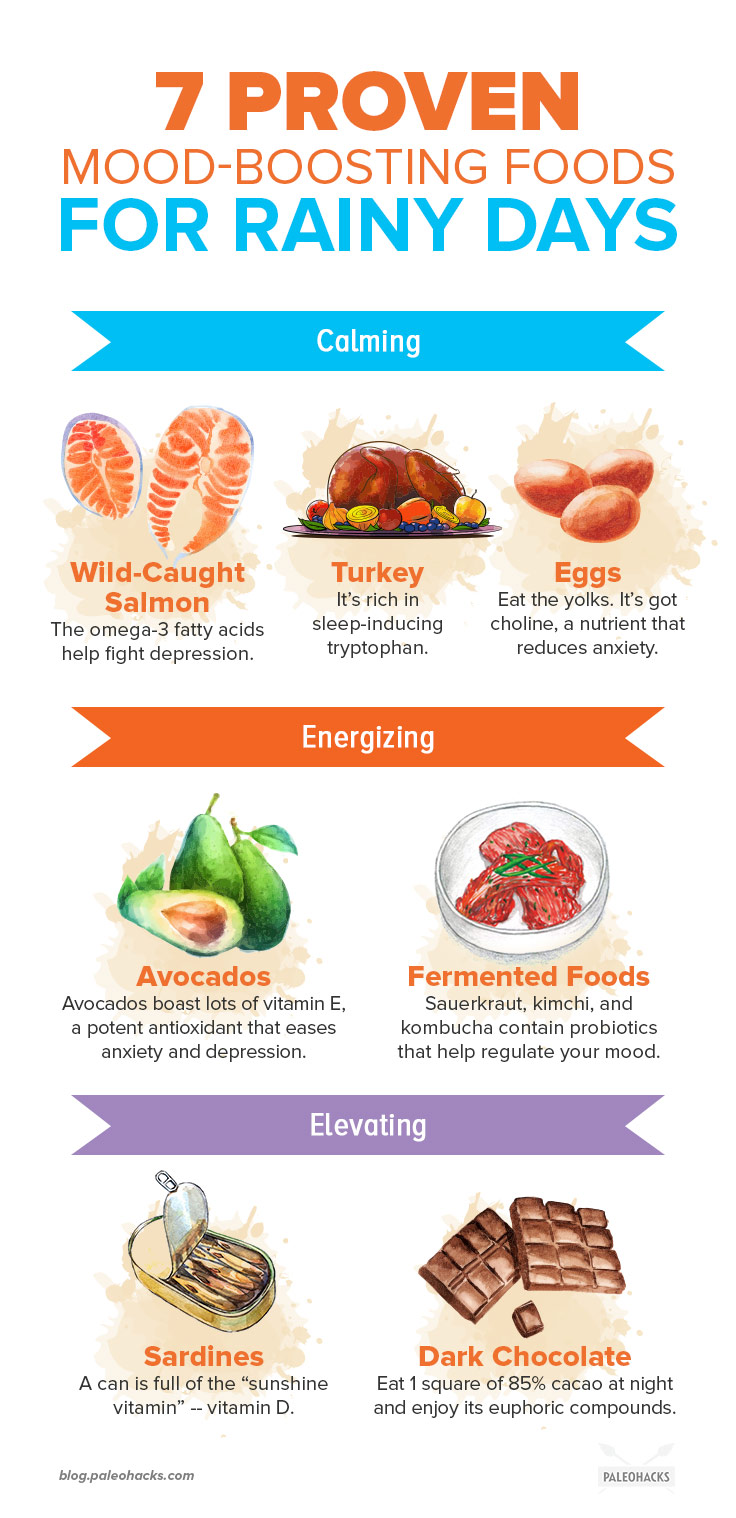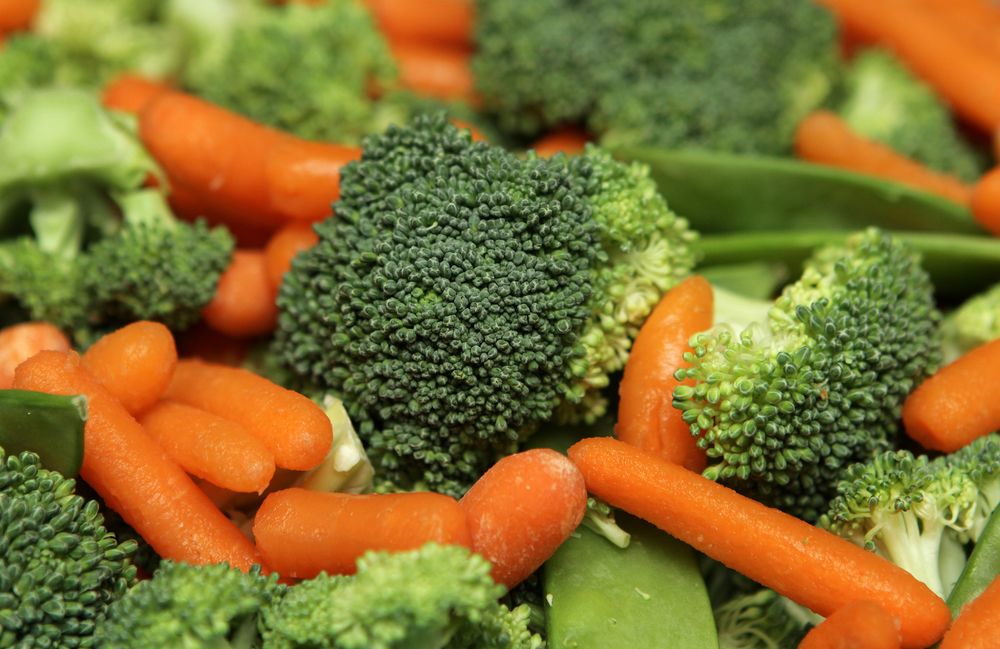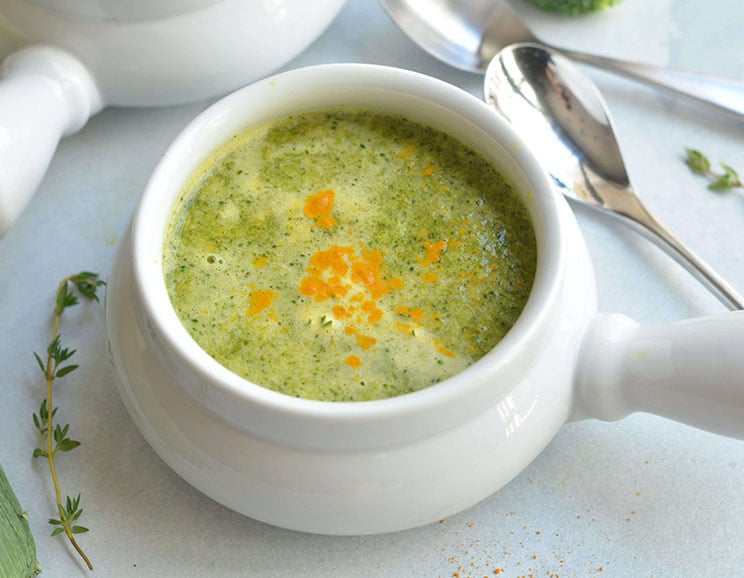Elevate your mood with these seven natural foods, like rich dark chocolate and creamy avocados.
When it comes to your mood, you may think that feeling low is all in your head. After all, most of us have been taught the idea that the brain is primarily responsible for our emotions and how we feel.
While this is true to an extent, did you know that we actually have a second brain? It not only produces most of the serotonin (an important neurotransmitter in regulating mood) in our bodies but also contains millions of nerve cells that “talk” directly to our brains. (1) This second brain is our gut.
Want to train your brain to be happier and healthier?
Click here to receive our FREE 7-Day Meditation Challenge!
The Gut-Brain Link
Our gut and brain are more closely connected than you may think. This link is called the gut-brain axis, and science proves that gut microorganisms synthesize key neurotransmitters that regulate your mood. (2) If you don’t have enough of them, or if you have an overgrowth of bad bacteria, your mood could be thrown off from your body not producing enough neurotransmitters. (3)
Our guts are lined with cells called enteroendocrine cells, which send information to our brain based on the nutrients we consume. This information travels from your gut along your vagus nerve, where it tells your brain what to feel and do. Like any type of communication in your body, this can be good or bad. (4)
For example: If you indulge in a sugary cupcake or other forms of junk food, you may feel a rush of momentary pleasure. This is because sugar prompts the release of dopamine, one of the “feel-good” neurotransmitters. (5)
But eating junk foods for pleasure has a downside. You have to keep eating these foods in order to trigger another dopamine release. After a while, this reduces the metabolism of serotonin in your gut. (6) Serotonin is essential for regulating and maintaining a good mood, so if you start to have less of it, you may experience a low mood more often. (7)
If you’re trying to keep your mood balanced and positive, seeking out a sugar hit is not the best way to do it.
Luckily, there are several nutrient-rich foods that boost and regulate your mood without the roller coaster of emotions. They can up your serotonin levels and even provide amino acids that help regulate mood.
Foods to Boost and Regulate Your Mood
Below we’ve broken down these foods based on the “mood” you’re after. Feeling anxious? Check out the foods that are proven to help calm you down. Feeling a little low? Get a boost from the snacks that will increase energy.
Try eating these foods at least three times a week for best results. One exception: We totally condone a square of extra dark chocolate every night.
Calming Foods
Wild-Caught Salmon

Salmon is rich in omega-3 fatty acids, which can prevent and improve mood problems such as depression and bipolar disorder. (8)
Omega-3s reduce inflammation and protect neurons, leading to positive psychotropic effects. Perhaps not surprisingly, people who suffer from mood disorders and depression have lower levels of omega-3s than those without. (9)
Long story short: Eat salmon frequently to keep your mood balanced and happy.
Turkey

There’s a reason we feel satisfied and content (and maybe even a little sleepy) after the Thanksgiving meal. Turkey is rich in tryptophan, an essential amino acid needed to produce serotonin.
Studies show that people who consume high-tryptophan diets experience significant mood improvements compared to those that don’t, namely because of the increase in serotonin. (10) If that’s not a reason to make turkey a staple outside of the holidays, we don’t know what is.
Eggs

If anxiety is to blame for your not-so-fantastic mood, try eating more eggs.
Eggs are rich in choline, a nutrient that helps support the nervous system and aid in the formation of neurotransmitters. One study showed that choline can help reduce anxiety, and also that people with anxiety disorders tend to have low choline levels. (11, 12)
Before you start to make that egg white omelet, remember this: the yolks contain the majority of choline.
Energizing Foods
Avocados

These creamy fruits also play a hand in reducing depression and low mood. One study revealed that levels of vitamin E are lower in people who suffer from depression. (14)
Add half an avocado to your salads a few times a week to keep your mood up.
Fermented Foods

Fermented foods contain probiotics, which are beneficial bacteria that help keep your gut healthy. Research shows that probiotics can have a positive effect on your mood as well, with one study finding that stress and cortisol levels were lower in participants who took probiotics regularly. (15)
Add fermented foods like sauerkraut, kimchi, and kombucha to your daily diet, or try supplementing with a probiotic capsule. Look for no less than 1 billion “CFUs” or live organisms to ensure you’re getting enough bacteria to colonize your gut.
Elevating Foods
Sardines

Sardines are another rich source of omega-3, which helps keep mood disorders, including anxiety, at bay. (16)
A can of these little fishes can also help boost your vitamin D. Studies show that the sunshine vitamin reduces the chance of developing mood disorders like depression and even helps reduce the risk of children developing schizophrenia as adults. (17) It’s important to get enough vitamin D to keep a “sunny” mood, especially if you don’t get very much sun exposure daily.
As you can see, the omega-3s in sardines can keep anxiety at bay, while vitamin D can reduce depression, making them great for overall mood regulation.
Fortunately, sardines are quite affordable, so don’t be afraid to alternate them with your salmon!
Chocolate

There’s a reason most of us love chocolate, and it has to do with more than just the flavor.
If you’ve ever gone on a chocolate binge during a stressful or emotional time, you can thank the combination of unique compounds that are able to influence mood and cognition. These include theobromine, a molecule similar to caffeine that boosts cognitive performance, cocoa flavonoids, and compounds similar to cannabinoids, such as the “euphoria-causing” molecule anandamide. (18)
Researchers aren’t entirely sure which exact compound is responsible for the feel-good effect of chocolate, but it’s most likely the whole package. Its combination of energy-boosting compounds along with “euphoric” compounds that can help you de-stress, make it excellent for any mood occasion.
Go ahead and indulge in a square of dark chocolate (85 percent or higher cacao content) as a nightly feel-good dessert.
The Bottom Line
Your gut and brain are directly linked by neurons that send information about the nutrients you’re consuming and how they’re affecting your body. It only makes sense that the foods you eat will have an effect on your mood.
Choosing foods on this list will provide your brain and nervous system with the building blocks it needs to keep you healthy, and, of course, happy.

(Read This Next: 6 Simple Ways to Boost Dopamine Levels, Mood and Energy


 The Boyfriend Brisket Recipe
The Boyfriend Brisket Recipe






Show Comments